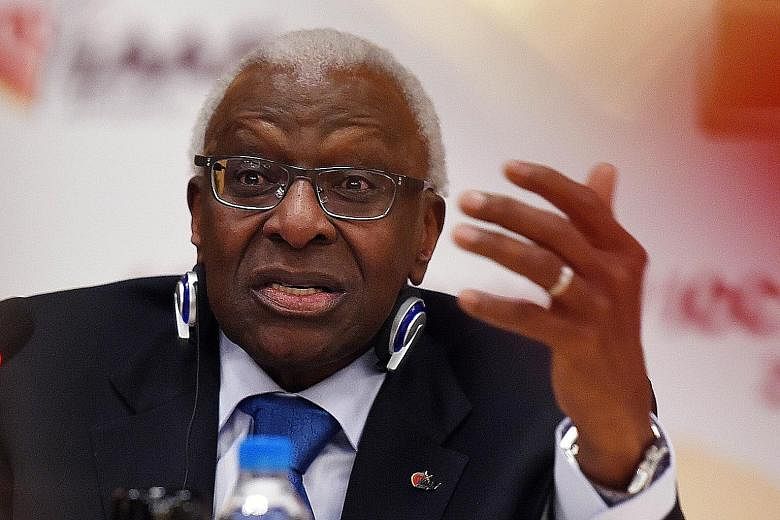LONDON • The IAAF considered hiding Russian doping bans from the public before London 2012 and recognised that more than 42 per cent of all tested elite athletes from the country were cheating, in the latest revelations to assail the tattered credibility of world athletics.
Internal documents obtained by the Associated Press also show that as far back as 2009, the International Association of Athletics Federations (IAAF) knew Russia's doping problem was so entrenched it feared athletes were at risk of killing themselves through the use of EPO and blood transfusions.
"This matter of the Russian athletes' blood levels is now so serious and is not getting any better (in fact possibly getting worse) that immediate and drastic action is needed," Pierre Weiss, then the IAAF general secretary, wrote in an Oct 14, 2009 hand-delivered letter to Valentin Balakhnichev, the Russian athletics president banned last week for life from the sport.
"Not only are these athletes cheating their fellow competitors but at these levels, are also putting their health and even their own lives in very serious danger," he wrote, telling Balakhnichev that blood results from Russian athletes "recorded some of the highest values ever seen since the IAAF started testing".
Tests conducted at the 2009 World Championships, where Russia won 13 medals, "strongly suggest a systematic abuse of blood doping or EPO-related products," Weiss added.
It was not until November, following the independent report by Dick Pound commissioned after an explosive ARD documentary, that Russia was banned from competition for state-sponsored doping.
The latest revelations will only increase the pressure on new IAAF president, Sebastian Coe, before Pound unveils the second part of his report into systemic doping in Russia and related corruption at the IAAF today.
The source that leaked the documents believed they show some anti-doping officials did their best to do all they could to keep Russian cheats from competing. But they also show that many senior IAAF officials knew there was a major problem for at least six years and spent much of that time trying to cajole Russia into doing something about it.
An internal briefing in September 2012 for Lamine Diack, IAAF president at the time, estimated 42 per cent of tested Russian elite athletes doped. Suspected doping in Turkey, Spain, Morocco and Ukraine also "is particularly worrying", it said.
The IAAF confirmed to AP that the letters were genuine. The IAAF spokesman, Chris Turner, said they were a "clear, open warning" and insisted it has been "very strong" in dealing with Russia.
By 2011, two years after its launch, the IAAF's "blood passport" testing regime was starting to flag so many suspected Russian dopers that officials explored the idea of breaking their own rules and those of the World Anti-Doping Agency by dealing with some cases privately.
The notes proposed a two-pronged approach. The best-known elite Russian athletes most likely to win medals at the 2012 Olympics would be banned in the normal manner but there would be a "rapid and discreet" handling of second-tier cases for less well-known athletes whose sudden disappearance from competition would likely pass unnoticed.
For those athletes who agreed to the deal, the IAAF would in turn "undertake not to publish the sanction", which would be shortened to two years from four, according to a note on Dec 5, 2011.
The IAAF says the proposals were never put into practice. Balakhnichev told the AP they also never reached him.
THE GUARDIAN

